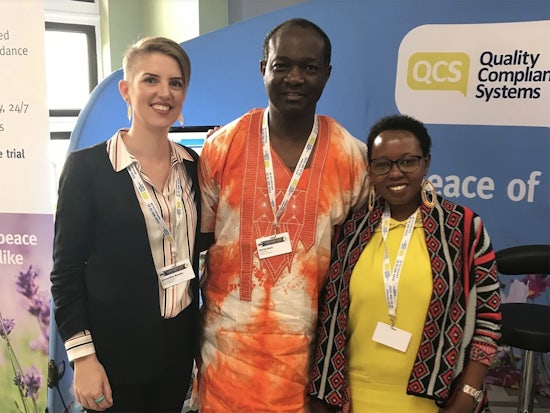Rethinking ageing in the Commonwealth
Have you ever had the opportunity to hear how ageing impacts 2.4 billion people? The recent ‘Ageing in Common’ Conference by CommonAge and National Care Forum (UK) held in Berkshire, UK, brought together 23 different countries, with 23 different ways of working, to learn about diverse ageing services, promote the CommonAge Ageing in the Commonwealth report, and connect on a global scale.

Young leader in aged care Samantha Bowen with some other attendees of the Ageing in Common conference last month (Source: Samantha Bowen)
Here Samantha Bowen reflects on the key themes and lessons she took away from attending the inaugural event.
The two central themes heard were that language about older adults is vital in challenging ageism, and that we all have massive opportunity to create the ageing future we wish to be part of.
Our Commonwealth encompasses over 2.4 billion people which includes developing and developed nations all with different challenges, assumptions, and strengths.
This conference offered as a reminder that 1 in 8 people across our planet are over the age of 60 and that ageing is not unique to Australia – it’s an evolving global issue – and that together we have what it takes to create waves, build a creative agenda, and put ageing on the international stage.
The speaker list covered a “who’s who” of the top experts of global ageing including – Dr John Beard (Director of Ageing and Life Course Department, WHO), Dr George Alessi (Senior Advisor,Public Health England) and Dr George Leeson (Oxford Institute of Population Ageing).
All spoke about the importance language has in changing and challenging ageism in our workplaces, communities, and society; moving from ‘care of’ to supporting healthy ageing; consumer directed to ‘relationship led’ care; or functional ability to ‘purpose and belonging’.
Many speakers, executives, and delegates spoke about the challenges we all experience – funding cuts, poor recognition of workers, providing services to an growing diverse aged population is increasingly difficult, and more.
What I realised is that Australia’s system with central funding sources, compliance and regulation processes, is unique. Our system allows all our workers and leaders to understand what is required, whereas many ‘young’ countries have no national ageing agenda at all, creating a great opportunity to develop and implement the positive ageing practices from more developed nations.
Other countries left each region or locality to impose services independently of each other, creating duplication and service misunderstandings. While our aged care system is far from perfect, there is a strong foundation in which we can build upon and evolve.
All of us carry a huge weight on our shoulders as we advocate, support, and build a better industry. The speakers challenged us to do more and create an agenda that supports our elders to age with meaning and purpose – not just to be ‘productive’ – pushing the notion that organisations were more than just ‘services’ or there to stop functional decline.
We are a social movement and a community that must be more authentic and collaborative across our regions, borders, nations and time zones. All Governments are experiencing reductions in funding, ageist attitudes to change, and difficulties supporting aged care service.
None of us can continue to blindly accept what we are given to care for our ageing communities. Our services are needed, demand is rising, and the vital work we provide must be acknowledged.
Those that continue to stay silent must ask themselves if they are complicit in the institutional structures that enable ageism to exist.
Conferences like this are building optimism around aged care and the prospects before us. It made me reflect on the ongoing negativity we see everyday towards industry change; it can be seen through our language, our lack of funding for ageing services, and poor understanding between what our communities are expecting and what organisations can provide.
Australia has a robust and well recognised aged care system, but we need to do more to build its capacity for our ageing future. The opportunity is ripe to challenge our Government and innovate beyond the Aged Care Workforce Taskforce. The importance of having it on our Commonwealth agenda reaffirms that ageing must be a priority for our Federal and State Governments too.
‘Ageing in Common’ showed that living longer is a privilege we all look forward to. We are all part of a rapidly ageing world with enormous opportunity to change the conversation to one of possibility. We must embrace passion, and challenge assumptions.
No Commonwealth nation has a solution. But our future must include passionate optimism as without it we cannot inspire others to join us on this long, convoluted, ageing journey. This conference encouraged me to continue speaking up and raising awareness of opportunities for us all to be part of this discussion – no matter what our age. Will you join me?

Samantha Bowen is the Founding Director ofAcorn Network. Her focus is to inspire us all to get involved and see the opportunities within our aged care sector. She is a Federal Advisory Board Member for NNIDR, an international speaker, an advocate for young leaders in aged care, and firmly believes that now is the time to count the leaders around us to build a future we all want to grow old in.
Samantha would like to thank the CommonAge Association and QCS for creating the opportunity to attend this event through a generous bursary.











![The new Aged Care Act exposure draft is slated for release in December of 2023, but advocates hope to see it rolled out on January 1, 2024. [Source: Shutterstock]](https://agedcareguide-assets.imgix.net/news/articles/wp/agedcareact__0811.jpg?fm=pjpg&w=520&format=auto&q=65)












Comments